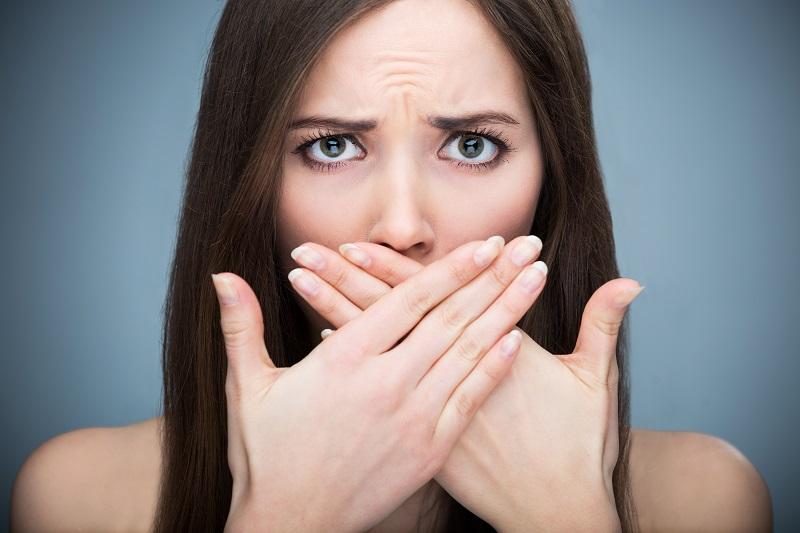02
2021
Jan

Can my breath smell bad?
Have you noticed that when you talk to people face-to-face, they walk away from you? If you think your breath smells bad, there's a simple test you can do. Lick and smell the inside of your wrist, or ask about it to a friend whose opinion you trust honesty.
Causes
The causes of bad breath, which is a common problem in everyday life, also vary.
Persistent halitosis is often caused by fragrant gases released by bacteria that cover your teeth, gums and tongue. In addition, pieces of food that attach between your teeth and your tongue rot and sometimes it can cause an unpleasant smell. Strong fragrant foods such as garlic, coffee and onions can contribute to the problem. This is why it is very important that you brush your teeth correctly and regularly. This helps your breath smell fresh.
Dental plaque, which causes gum disease and tooth decay, is one of the causes of bad breath. If the problem is caused by this, early detection is very important to prevent tooth loss.
'Dry mouth' (xerostomia) causes bacteria to accumulate and bad breath as your mouth produces less saliva. Dry mouth can be caused by certain medications, salivary gland problems, or constant breathing through your mouth instead of your nose. If you have dry mouth, your dental team may recommend or prescribe an artificial saliva product.
Smoking is one of the main cause of bad breath. Tobacco causes a distinctive bad breath. In this case, the only answer is to quit smoking. As well as making your breath smell, smoking causes staining and loss of taste and irritates your gums. People who smoke have a higher risk of developing gum disease and developing oral cancer, lung cancer and heart disease. If you quit smoking but still have bad breath, you should see your dental team or doctor for advice.
Bad breath can be a harbinger other medical problems that include infections in the throat, nose, or lungs; sinusitis; bronchitis; diabetes; or liver or kidney problems. If your dentist confirms that your mouth is healthy, you can contact with your family doctor or a specialist to find out the cause of your bad breath.
If you are experiencing bad breath problems, you will need to start a routine to keep your mouth clean and fresh. Regular checkups will allow your dentist to pay attention to any place where plaque gets stuck between your teeth. Your dental team will be able to clean all areas that are difficult to reach. They will also be able to show you the best way to clean your teeth and gums and areas you may be missing, including your tongue.
Can I prevent bad breath?
• If your breath smells bad, try to keep a diary of all the foods you eat and list the medications you take. Share this diary with your dentist.
• Brush your teeth and gums with fluoride toothpaste at night before going to bed and at least once during the day. Don't forget to brush your tongue or use a tongue scraper.
• Reduce sugary food and drink consumption.
• Visit your dental team regularly as often as they recommend.
• Clean between your teeth with 'interdental' brushes or floss at least once a day - brushing alone cleans only about 60 percent of your tooth surface.
• Use mouthwash - some contain antibacterial substances that can kill the bacteria that cause your breath to smell bad. It is very important to pay attention to a topic here. Some mouthwashes containing chlorhexidine and recommended for gum disease can cause tooth spots if you use it for a long time. It is important to read the manufacturer's instructions or ask how to use them.
• If you continue to suffer from bad breath, visit your dental team to make sure mouthwash doesn't cover up a more serious underlying problem
• Chew sugar - free gum. It helps your mouth produce saliva and stops it drying out.
CLEANING DENTURES
As much as cleaning your natural teeth, cleaning dentures is also important. Food fragments can be attached to the edges of dentures and clasps, and if you do not clean them thoroughly, the food will rot. You should have a separate toothbrush to clean your dentures. The general rule is: brush, soak and brush again. Clean your dentures with a bowl of water in case you drop them. Brush your dentures before wetting to help remove any pieces of food.
Be sure to clean all surfaces of the dentures, including the surface that near to your gums. If you notice a stain or lime, have your dentures cleaned by your dental team. Most dentists still recommend a small to medium sized toothbrush or, if possible, a special denture brush.



.png)